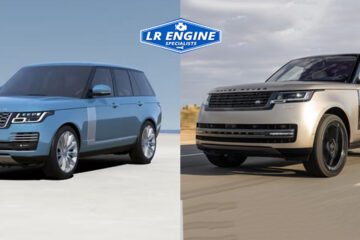Introduction:
While opting between the Range Rover 2.0 engine and a Land Rover diesel engine, it’s mandatory to understand how they compare in terms of performance, fuel efficiency, maintenance costs, and reliability. The Range Rover 2.0 petrol engine is designed for effortless city driving with incredible acceleration, while the diesel engine is chosen for long-distance travel and towing capabilities. Each option has specific benefits and drawbacks influencing the driving experience and overall ownership costs.
Discover the primary differences between petrol and diesel Range Rover engines to determine which best suits your lifestyle. We’ll evaluate features like acceleration, fuel efficiency, long-term durability, and environmental impact, guaranteeing you make an informed decision. Even if you prioritize performance, affordability, or sustainability, understanding the advantages and disadvantages of both engine types will help you find the best fit for your needs.
Performance Comparison
The Range Rover 2.0 engine performance offers an energetic and responsive driving experience, making it a perfect choice for urban and highway driving. With a turbocharged four-cylinder petrol engine, it delivers effortless acceleration and a refined ride. The horsepower output generally ranges from 296 to 300 bhp, providing commendable speed and agility. This engine is exemplary for drivers who enjoy quick acceleration and smooth handling.
On the other side, the Land Rover diesel engine specs show superior torque, making it an ideal option for off-road driving and towing heavy loads. Diesel engines, specifically the 3.0-litre six-cylinder variants, generate remarkably more torque than the petrol alternative, making them better suited for rugged landscapes and long-haul journeys. While petrol engines offer better acceleration, diesel engines shine in low-end power, making them more efficient in challenging terrains.
For city driving, the Range Rover 2.0 engine performs outstandingly well due to its lightweight construction and fast throttle response. However, for continuous off-road adventures and towing heavy loads, the diesel engine remains the more workable choice.
Fuel Efficiency & Running Costs
One of the most important factors when choosing between a petrol and diesel Range Rover is fuel efficiency. The Range Rover fuel efficiency comparison shows that diesel engines normally have superior mileage. A Land Rover diesel engine can achieve around 35 to 40 MPG, depending on the driving conditions, whereas the Range Rover 2.0 petrol engine generally delivers 25 to 30 MPG.
Diesel engines are designed to be more fuel-efficient on long-distance drives, making them perfect for highway journeys. In contrast, the petrol engine consumes more fuel, specifically in stop-and-go traffic, which increases overall running costs. Also, diesel fuel is often cheaper per mile than petrol, making it a more reasonable choice for frequent travelers.
However, fuel savings with diesel engines come with extra expenses. Diesel vehicles often have higher initial purchase costs and may need more expensive maintenance over time. Petrol engines, while less fuel-efficient, are generally cheaper to maintain, making them a better option for drivers who prioritize lower overall costs.
Maintenance & Reliability
Both petrol and diesel Range Rover engines have their maintenance demands, affecting overall costs. The Range Rover 2.0 engine is relatively low-maintenance, with fewer intricate components compared to a diesel engine. Petrol engines normally experience fewer emission-related issues and don’t need Diesel Particulate Filter (DPF) cleaning, which is essential for diesel models.
General issues with the Range Rover 2.0 engine include carbon buildup in the intake valves, turbocharger problems, and potential fuel injector issues. Routine maintenance and good-quality fuel usage can lessen these problems.
In comparison, common problems with Range Rover diesel engines include DPF clogging, injector failures, and EGR valve issues. Diesel engines often need specialized servicing, which can be expensive over time. Also, diesel vehicles experience higher wear and tear on components such as turbochargers and fuel pumps, further increasing maintenance expenses.
In respect of long-term reliability, diesel engines have an edge in reliability and lifespan. A well-maintained diesel engine can last notably longer than a petrol engine due to its lower operating RPM and stronger internal components. However, advanced petrol engines have also enhanced longevity, offering durable performance when properly maintained.
Environmental Impact
Environmental issues play a vital role in the decision-making process between petrol and diesel Range Rovers. The CO₂ emissions of a Range Rover 2.0 engine are normally lower than those of diesel engines, making it a more environmentally friendly choice. Petrol engines generate fewer nitrogen oxides (NOx) and particulate matter, minimizing their overall environmental impact.
On the other hand, Land Rover diesel engine specs show that diesel engines emit more NOx and fine particulates, contributing to air pollution. Although advanced diesel engines comply with Euro 6 emission standards, they still face government restrictions and potential future bans in specific cities. Many governments worldwide are applying higher taxes and regulations on diesel vehicles, reducing their long-term viability.
When looking for resale value, petrol vehicles might have a benefit in urban markets where diesel restrictions are tightening. Where fuel efficiency and engine longevity are primary factors, diesel models maintain strong resale appeal. If environmental issues are a priority, the Range Rover 2.0 petrol engine is the better choice due to its lower emissions and fewer regulatory restrictions.
Which Engine Suits You Best?
Deciding between a Range Rover petrol vs diesel engine durability depends on your driving habits and priorities. If you primarily drive in urban environments, the Range Rover 2.0 engine is the most suitable choice. It offers effortless acceleration, lower emissions, and fewer maintenance issues, making it perfect for short-distance travel. Also, petrol engines warm up faster, which is favorable for cold-start conditions and continuous short trips.
For drivers who regularly travel long distances or require towing power, the Land Rover diesel engine is the better choice. Diesel engines surpass in fuel efficiency and torque, making them perfect for highway driving and off-road adventures. Also, if you plan to keep your vehicle for a prolonged period, a diesel engine’s longer lifespan and durability make it a worthwhile investment.
Real-world user reviews recommend that petrol-powered Range Rovers are favored for their effortless drive and responsiveness, while diesel models are preferred for their reasonable and long-distance capabilities. Ultimately, the decision comes down to your driving patterns, budget, and eco-consciousness.
Conclusion
Both the Range Rover 2.0 petrol engine and the Land Rover engine have their advantages and disadvantages. The petrol engine offers better acceleration, lower maintenance costs, and minimized emissions, making it a perfect choice for city drivers and those prioritizing sustainability. Meanwhile, the diesel engine provides excellent fuel efficiency, torque, and long-term reliability, making it exemplary for long-distance travel and towing needs.
If you want a fuel-efficient, long-lasting engine with incredible torque, the diesel engine is the better choice. However, if you prioritize effortless acceleration, lower emissions, and minimized maintenance costs, the Range Rover 2.0 petrol engine is the right choice. Weigh your driving style, budget, and future regulations when making your decision. Ultimately, selecting the best engine for a Range Rover depends on your requirements and lifestyle.
FAQs:
Which engine is better for city driving: Range Rover 2.0 or diesel?
The Range Rover 2.0 petrol engine is perfect for city driving due to its smooth acceleration and lower emissions.
Is the Range Rover 2.0 engine more fuel-efficient than the diesel?
No, the diesel engine offers better fuel efficiency, specifically for long-distance travel.
Which engine lasts longer: petrol or diesel Range Rover?
Diesel engines normally last longer due to their strong design and lower operating RPM.
Are diesel engines more expensive to maintain than petrol?
Yes, diesel engines tend to have higher maintenance costs, especially for components such as the DPF and injectors.
Which engine is better for towing: Range Rover 2.0 or diesel?
The diesel engine is better for towing heavy loads, due to its superior torque.


